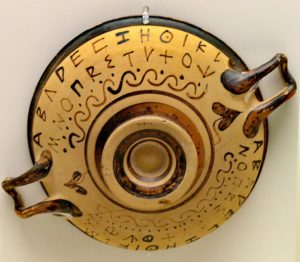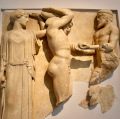This page incorporates resources to facilitate self-study or study groups, for those who are learning ancient Greek, or who wish to engage with and explore ancient Greek texts.
Members of Kosmos Society are running community study groups associated with these resources to support each others’ learning. If you are interested in taking part, please post in the Forum. If you are not currently a member, please complete the application form (at the bottom of the Home page) with some information about yourself, to request an invitation code.
Kosmos Society Greek Learning Modules:
- Introduction to Homeric Greek
- Attic Greek
- Word Studies and Translation
- Reading Homer
- First Steps in Digital Philology
Homeric Greek
Introduction to Homeric Greek
This Introduction to Homeric Greek series was created by members of the Kosmos Society (then called Hour 25) Community in coordination with Professor Graeme Bird as a community-generated, open access educational resource. The series is designed as a gentle introduction for absolute beginners.
Volume 1: Videos 1–16, Beginning with the Alphabet, with Graeme Bird and Community Members
Homeric poetry
“Introduction to the Meter of Homeric Epic”, with Leonard Muellner
Practicing Homeric epic meter: dactylic hexameter, with Leonard Muellner
For meter, you might also find this site useful:
Hypotactic: Greek and Latin Meter by David Chamberlain, University of Oregon: scanned versions of selected texts (CC-BY 4.0)
Homeric language and dialects
In these videos, Gregory Nagy, Douglas Frame, and Leonard Muellner discuss features of Homeric language:
Greek dialects and the poetic super-language
Greek dialects in the language of Homer: Mycenaean, and Arcadia
Homeric language as a system: the meaning of Nestor
Greek dialects in epic: the cake of Homeric poetry
Reading Homer aloud: pronunciation, rhythm, enjambments
Reading Homeric poetry without a safety net
Kosmos Society Homeric Study groups
Odyssey—Mondays: 9am ET. Suitable for all levels. Group collaborative translation about 20–30 lines, and close reading with discussion of words, grammar, formulas, themes.
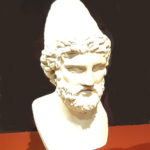
Iliad—Mondays: 1pm ET. Suitable for those with about a year of Greek. All members prepare a translation of 30 lines each week to share.

Attic Greek
Introduction to Attic Greek
This Introduction to Attic Greek comprises a series of video presentations made by Professor Leonard Muellner and Belisi Gillespie. These videos cover the content covered in two semesters of a college-level Introduction to Ancient Greek course. They are designed to be used in conjunction with the book Greek: An Intensive Course by Hardy Hansen and Gerald M. Quinn.
You can find a suggested syllabus and the videos here:
Introduction to Attic Greek: Volume 1 (Units 1–3), with Leonard Muellner and Belisi Gillespie
Introduction to Attic Greek: Volume 2 (Units 4–7), with Leonard Muellner and Belisi Gillespie
Introduction to Attic Greek: Volume 3 (Units 8–10), with Leonard Muellner and Belisi Gillespie
Introduction to Attic Greek: Volume 4 (Units 11–14), with Leonard Muellner and Belisi Gillespie
Introduction to Attic Greek: Volume 5 (Units 15–17), with Leonard Muellner and Belisi Gillespie
Introduction to Attic Greek: Volume 6 (Units 18–20), with Leonard Muellner and Belisi Gillespie
Concepts of ancient Greek
Video: Actions in Time, with Leonard Muellner
Video: Speaking about This and That, with Leonard Muellner
Video: Finding Beauty in the Smallest Words: Anna Bonifazi on Ancient Greek Particles
Video: The language and style of Thucydides, with Jeffrey Rusten
Kosmos Society Attic Greek study groups
We have found that by meeting weekly, participants take just over two years to cover the whole content of Hansen & Quinn.
We hope to start a new beginners’ group in due course.
Textkit
This website has a number of free downloadable Greek textbooks and Reading Texts for students. You can find the collection on this page:
https://www.textkit.com/greek_grammar.php
Word Studies and Translation
Our Word Studies and Translation module is designed to introduce the basic tools and skills necessary to explore an ancient Greek text or word on Perseus and other online resources.
Guides and Video Demonstrations
Kosmos Society Page: H24H Core Greek Vocabulary with Greek
Beyond Translation Video: The Greek Alphabet, with Joel Christensen
Beyond Translation Video: Using Perseus Digital Library, with Anna Krohn
Beyond Translation Video: Decoding Ancient Greek Dictionary Entries, with Joel Christensen
Beyond Translation Guide and Challenge: Investigating Greek Words: Quick Guide to Perseus with Illustrated Worked Examples
Beyond Translation Video: Ancient Greek as an Inflected Language, with Graeme Bird
Beyond Translation Videos, Guides, and Challenge: Using Chicago Homer for Word Studies (Demonstration and Quick Guides with Illustrated Worked Examples)
Beyond Translation Videos and Guides: Using Perseus under PhiloLogic, for Word Studies (Demonstration and Quick Guides with Illustrated Worked Examples)
Video and Guide: Using Logeion: Quick Guide
The Free First Thousand Years of Greek, with Leonard Muellner
Introduction to the Scaife Viewer, with Leonard Muellner (video; opens in new tab)
Kosmos Society members have carried out a number of word studies using some or all of these resources.
Geoffrey Steadman: Greek Texts with Facing Vocabulary and Commentary
Geoffrey Steadman has produced some commentaries featuring a selection of passages from Greek (and Latin) texts with vocabulary and commentary. Members of the Kosmos Society have used some of the Greek ones and found them helpful.
His Greek texts include selections from Homer, Herodotus, Plato, Sophocles.
You can find the available texts on his website:
https://geoffreysteadman.com/
Kosmos Society Translation study groups
Herodotus—Wednesdays, 11am ET. Suitable for those with about about a year of Greek. Each member of the group prepares two short passages in sequence; group discussion.
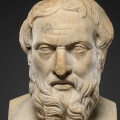
Thucydides—Thursdays 9:30am ET. Suitable for those with at least two years of Greek. Each participant tries to translate the entire selection and everyone shares their questions and translations together.

Plato’s Meno—Fridays 4pm ET. Suitable for those with at least a year of Greek. All members prepare a passage and share translation. Discussion of grammar and content.
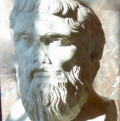
Euripides Medea translation group—Tuesdays 3pm ET. Suitable for those with at least a year of Greek. All members prepare a passage, read aloud, and share translation. Discussion of vocabulary, grammar and content; we also touch on meter.

Poetry translation group—Mondays 11:30am ET. Suitable for those with at least a year of Greek. All members prepare a passage, read aloud, and share translation. Discussion of vocabulary, grammar and content; we also touch on meter.

Reading Homer

These videos are from a series on reading Homeric epic in ancient Greek. In each installment we read, translate, and discuss a small passage in the original Greek in the most accessible way. If you’ve ever wanted to read Homer in ancient Greek, here is your chance to do so with teachers who have spent a lifetime studying these works. Together Gregory Nagy, Douglas Frame, and Leonard Muellner help even new readers explore the words and formulas that make “the poetry of grammar and the grammar of poetry” in Homeric epic so exquisite and rewarding.
-
-
- Homeric Greek | Iliad 1.1–9: The poetry of grammar, the grammar of poetry
- Homeric Greek | Odyssey 1.1–10: Starting to begin the Odyssey
- Homeric Greek | Odyssey 1.11–26: Threads of song
- Homeric Greek | Odyssey 1.27–43
- Homeric Greek | Odyssey 1.44–62: Athena, Odysseus, and longing for home
- Homeric Greek | Odyssey 1.63–79: Polyphemus, traditions of the Cyclopes, Poseidon and Zeus
- Homeric Greek | Odyssey 1.80–92: Epithets of gods, of cattle, of Achaeans, and of Odysseus
- Homeric Greek | Odyssey 1.93–98: Variants in Telemachus’ visits, Nestor, and Athena
- Homeric Greek | Odyssey 1.99–112: Athena at the threshold
- Homeric Greek | Odyssey 1.113–117: Teleachus visualizing his father
- Homeric Greek | Odyssey 1.118–124: xeinos as stranger and as guest
- Homeric Greek | Odyssey 1.125–135: Receiving a guest, and seating arrangements
- Homeric Greek | Odyssey 1.136–143: Dining, and serving food
- Homeric Greek | Odyssey 1.144–148: Couches, chairs, and camera’s choreography
- Homeric Greek | Odyssey 1.149–155: Desire for food and drink, and Homeric stringed instruments
- Homeric Greek | Odyssey 1.156–162: Rotting bones, neglected rules of reciprocity, and powers of particles
- Homeric Greek | Odyssey 1.163–168: Comparatives, the lost homecoming, and Telemachus’ misery
- Homeric Greek | Odyssey 1.169–177, part 1: call him to keînos
- Homeric Greek | Odyssey 1.169–177, part 2: Epiphanies and Athena’s travels
- Homeric Greek | Odyssey 1.178–186: Multiple versions, wine-bright sea, and blazing iron
- Homeric Greek | Odyssey 1.187–193: Rattling around in enjambments
- Homeric Greek | Odyssey 1.194–202: Wild men holding Odysseus back
- Homeric Greek | Odyssey 1.203–212: Are you really from Odysseus, big boy that you are
- Homeric Greek: Odyssey 1.213–220: Inspiring Telemachus
- Homeric Greek: Odyssey 1.221–229: What’s the feast? It’s not a potluck
- Homeric Greek: Odyssey 1.230–238: Invisible man, skein of war and movable nu
- Homeric Greek: Odyssey 1.239–251: Harpies, suitors and all the Achaeans
- Homeric Greek: Odyssey 1.252–256: At the front gates
- Homeric Greek: Odyssey 1.255–267: Wish or condition?
-
First Steps in Digital Philology
Our First Steps in Digital Philology module builds on the previous units by developing the awareness of key concepts, resources, and projects that allow citizen scholars to begin contributing new knowledge to the classics community.
A Homeric Commentary in Progress based on the research of Milman Parry and Albert Lord
Research & Reading: “Discovery Procedures and Principles for Homeric Research,” in Classics@ 3, by Leonard Muellner
A Concise Inventory of Greek Etymologies, an ongoing publication providing access to etymologies as part of the formulaic system of early Greek poetry
Digital Project: Ancient Greek and Latin Dependency Treebanks, Perseus Digital Library
Scaife Viewer (in development), a reading environment for pre-modern text collections in both their original languages and in translation
Digital Project: The Homer Multitext Project, Casey Dué & Mary Ebbott, Editors; Christopher Blackwell & Neel Smith, Project Architects
An Exploration of Homeric Multitextuality (Kosmos Society)
Online Resource: A Gentle Introduction to XML, via the Text Encoding Initiative
Online Resource: Ancient Greek OCR, by Nick White
Online Resource: Digital Sappho
Look for associated threads in the Kosmos Society Discussion Forum where you can ask questions and talk with others who may be working through these modules.
Note: The Kosmos Society is not responsible for the content of external sites.
